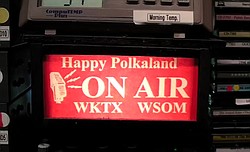Ethnic radio plays on in Mahoning Valley
Happy Polkaland

Larry and Diana Walk have been broadcasting polka music in the Mahoning Valley for 48 years.
Hungarian, German, Spanish, polka music fills Valley airwaves
By Robert Guttersohn
Inside Larry and Diana Walk’s Austintown home, an on-air warning light above a door frame emits a soft, red hue.
“Well hello there, good people. This is your pal, Larry Walk, inviting you to stay tuned for the happiest in recorded polka music on a super polka Sunday afternoon.”
The room erupts into an up-beat polka song as Larry sits quietly, rubbing his thumb along his dark mustache.
For 25 of his 48 radio years, he and his wife have broadcast 61/2 hours of polka every Sunday on WKTX-AM 830 and WSOM-AM 600 from a tiny room filled with microphones, polka paraphernalia and CD cases piled like mini-skyscrapers.
As migrants moved to Youngstown in the early 20th century, many sought not only a better life but also ethnic camaraderie in their churches, newspapers and the air waves.
“We were the melting pot,” Larry said. “Everyone could come in, and we could enjoy our traditional music. We could enjoy our traditional foods.”
Other local radio hosts said they, too, were immersed in their ethnic traditions as children.
Terry Check travels from Chesterland every other Saturday to broadcast “Souvenirs of Hungary” over Struthers High School’s WKTL FM 90.7. He and his father started playing Hungarian Cszardas and Halgato tunes there on Mother’s Day 1979.
“We didn’t do it for money,” Check said. “It was for the love of our music; the love of our culture.”
Today, seven years after his father died, Check’s children are carrying on the Hungarian tradition both at the station and at various events in the Valley.
Since the mid-1960s, WKTL has been the area’s staple for multicultural music, said Struthers schools Superintendent Robert Rostan.
“Our Saturday program reaches out to so many different cultures,” he said.
The Saturday lineup ranges from “Spanish Hour” to “German Melodies.”
“Listeners say ‘I just love that song; can you play it next week for me?’” Helga Wengler said while sitting with her husband, Wolfgang, in their Bavarian-style home in Youngstown.
Together they have hosted “German Melodies” since 1982, opening each segment with “Lieder der Heimat,” or “Songs from the Homeland.”
Their home is filled with German furnishings but folded into a triangle, framed and hung above a dining-room window is the U.S. flag given to them after becoming citizens Sept 3, 1964.
Unlike the Walks and the Checks, the Wenglers are first-generation immigrants.
Wolfgang and Helga, boyfriend and girlfriend in Frankfurt, moved here separately in the mid-1950s and married in 1957.
They were actively involved in German and social clubs in the city. Wolfgang was president of the Youngstown Maennerchor for 13 years. Helga was president of the women’s auxiliary club.
“We keep the heritage going,” Helga said.
But as Wolfgang flipped through the thick Maennerchor album filled with memorabilia since the club’s inception in 1863, the number of members gradually declined each year. The last photograph features the choir taken in 2010, a year before it disbanded.
“At least 20 years ago, pretty close to one-third of people in Youngstown had some sort of German heritage,” Wolfgang said.
The future of ethnic radio in Youngstown is unclear.
Check pointed to the merging of traditionally Eastern-European Catholic churches due to lack of participants in Youngstown and Cleveland as a parallel for ethnic radio’s future.
“I, myself, am one of the youngest people doing it,” said Check, who is 56. “The younger generation isn’t getting involved with programming at WKTL.”
“Everyone has just turned into pasteurized milk,” Diana said, leaning on the door frame of their in-house studio.
But Val Pawlowski, who has broadcast Polka every Saturday on AM-830 for almost 17 award-winning years, disagrees.
“Because of the recession, people are doing more with their family,” Pawlowski said. “Polka is family.”
As proof, she said thousands of people of all ages showed up to the mid-June Simply Slavic festival, many more than expected.
“The economy being not the best has strengthened the family,” Pawlowski said. “It has strengthened polka.”
 43
43
